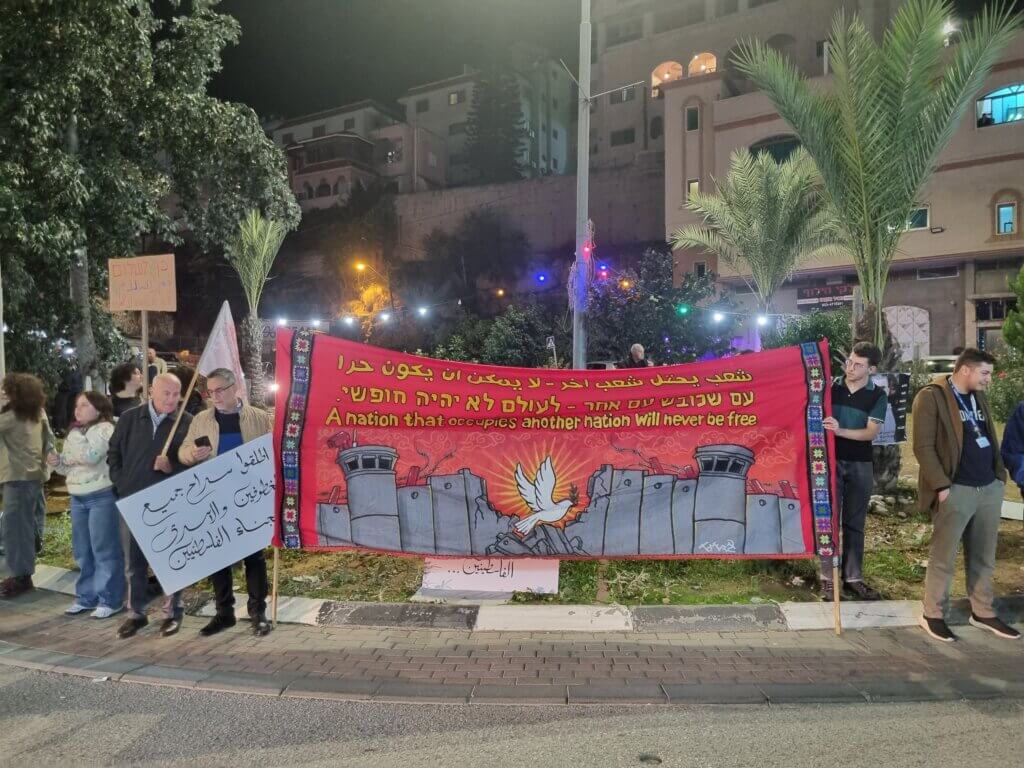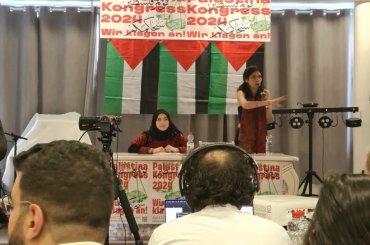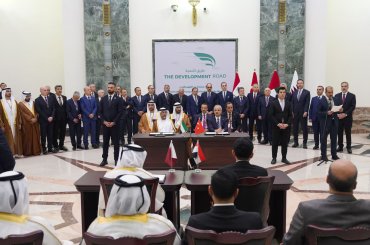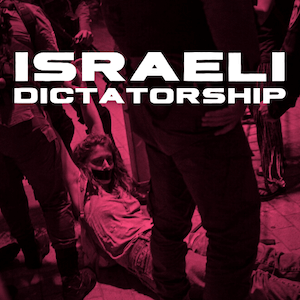
The current fascist-dominated Israeli government is not the result of the shock created by Hamas’ attacks on October 7. It was established by Binyamin Netanyahu on December 27, 2022. It was Netanyahu’s choice to appoint the extremist Itamar Ben-Gvir as Minister of National Security — in fact, the maestro of the state’s policy toward two million Palestinians in ‘48 Palestine and East Jerusalem. To make things clearer, another member of Ben Gvir’s party, Otzma Yehudit (“Jewish Power”), was appointed as “minister for the development of the Negev and Galilee,” where most 48 Palestinians live. The main goals of the state’s “development” plans in these areas are to destroy Arab homes and confiscate Arab land.
After October 7, when Israel started its bloody revenge attack on Gaza, there was strong pressure from the military establishment and from Israel’s imperialist backers to form a “unity government” and distance the openly racist troublemakers from the management of the war. Former generals Gantz and Eizenkot, with much more proven experience of fighting and killing Palestinians, joined Netanyahu in the inner war cabinet, but everybody was satisfied with leaving ‘48 Palestinians, who are formally citizens of Israel, to enjoy “Jewish Democracy” Ben-Gvir style.
Some contradictions within the establishment
As I have previously reported, after October 7, the police, the prosecution, and the courts all joined forces to stifle the right of expression of Palestinians and of anybody opposed to the mass killing of civilians in Gaza. They used the pretext of “the war situation” to forcefully prevent demonstrations and wage a campaign of hundreds of detentions and interrogations, even for minor posts on social media.
In the second month of the war, some internal conflicts started to appear inside the state apparatus. On November 20, Haaretz published an article (on November 21, it also appeared in English) titled “Israel’s State Prosecutor Warns Police: Unjustified Arrest of Dissenters Harms the Rule of Law.” According to the Haaretz article, even though some 99% of those arrested by the police for political reasons were Arab Palestinians (to say nothing of the over 3000 Palestinians arrested in the West Bank by the army), two out of the three cases criticized by the State Prosecutor — Amit Eisman — related to Jewish dissidents. The third case was the preventive detention of six leaders from the High Follow Up Committee, including four previous members of Knesset, for their intent to hold a quiet anti-war vigil in Nazareth.
Eisman should also blame himself for his instructions to the police. As mentioned in the same article:
“Since the war started, Israel’s law enforcement agencies have adopted a broader policy regarding investigations and prosecutions for crimes of incitement – a tendency that encouraged the filing of indictments against Arab citizens. Eisman allowed the senior officers of the police investigation division to order the interrogation of suspects for these offenses without receiving prior approval from the State Prosecutor’s Office, as is customary, and supported the filing of indictments even for a single statement.”
(emphasis added)
We could even feel the results of these internal conflicts in some of the cases that were brought to the courts lately. On Thursday, November 23, the police presented to the Haifa Magistrate’s Court an indictment against Na’im (not his real name) for “support of terrorism,” together with a request to hold him in prison until the end of his trial. Na’im studies law at Haifa University, and he is one of six students arrested due to the complaint filed against them by university management. The only basis for his indictment is a single post from October 7, showing Palestinian civilians celebrating upon an abandoned Israeli army vehicle, with the writing, “Good Morning, uncle.”
At the time, Na’im had already spent 12 days in the Megiddo security prison in harsh conditions. His lawyer, Afnan Khalifa, was pessimistic. She explained that she would have to study the evidence, which she could not see until the indictment. To argue in court against the indefinite remand by discrediting the evidence, she would have to agree to a temporary remand.
To validate the indictment, the police had to bring approval from the state prosecutor’s office. It had to be presented until 13:00, and time was running out. We were all surprised when the prosecutor finally appeared with the approval for the indictment and announced that they withdraw the request for remand. They did not even request house arrest.
Na’im was released with the sole limitation that he is not allowed to “touch the internet.” The judge commented that this does not make sense, as today, without the internet, one cannot even make appointments to the doctor or the bank. But he agreed to the police request, and we all were immensely happy to see Na’im released.
On Monday, November 27, three female students from “Nof Hagalil College” were indicted for social media posts. Unlike previous cases where the police insisted on detention till the end of the trial, one was released, and two were transferred to house arrest. The detention of the fourth student in this group was remanded for continuation of her interrogation.
I do not think that the divisions in the oppressive apparatus are between “democrats” and those “supporting dictatorship,” surely not between “left” and “right.” There is a growing messianic branch of Zionism that is an agent of chaos: they want to put as many Palestinians in jail as possible, to kill ever more Palestinians, to keep a permanent occupation of Gaza, and to build settlements there. Ultimately, they want to replace the al-Aqsa mosque with a Jewish Temple and complete the ethnic cleansing in all of Palestine. The more establishment types are more aware of the limitations of their power and try to balance their regime in a more sustainable way.
Hard limits on the right to protest
Concerning the right to protest, I last reported how the Bagatz (Israel’s High Court) forced the police to allow Hadash (a front organized around the Israeli Communist Party) a muted anti-war demonstration in Tel Aviv on November 18. It was limited to 700 participants, and the police checked everyone at the entrance and censored the banners.
If you wondered whether this was the harbinger of a resumption of the right to protest — well, not really.
Hadash continued to work hard to get permission to demonstrate in Umm al-Fahm, a central Palestinian town in “The Triangle,” forty kilometers southeast of Haifa. After weeks of negotiations, they arrived at an agreement with the police that allowed them to hold an anti-war vigil on Thursday, November 30. One of the conditions was that there would not be more than 50 participants.
Think for yourself — how strange it should be to organize a protest when your main concern is to convince people not to participate.
In the end, a few more people arrived, and the organizers had to request some of the local Umm al-Fahm youth to leave to let the guest who came from far away to demonstrate. You can watch a video of the vigil on Al-Jarmaq net.
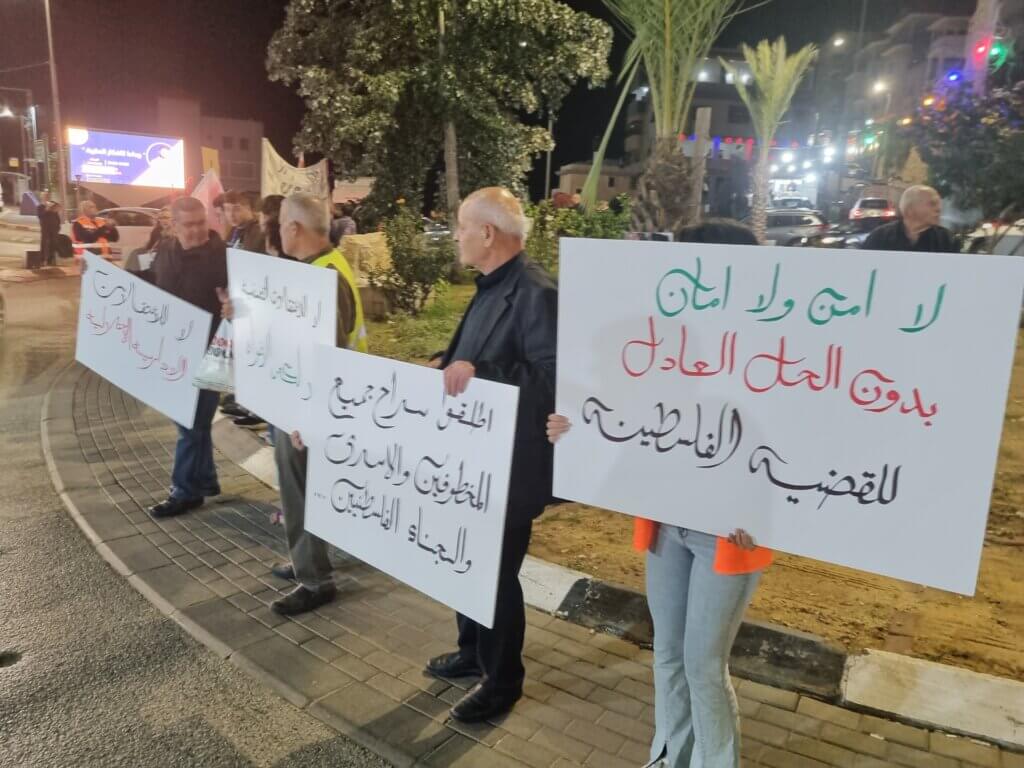
One of the factors that allowed Hadash to get permission for the Umm al-Fahm vigil was that it was presented as a common Arab-Jewish activity. The High Follow Up Committee tried to get permission for a limited anti-war vigil in Nazareth, but was met with consistent refusals. On November 25, the Follow Up Committee tried to organize a small vigil in Nazareth, which does not require a license. Still, the police arrived ahead of them with a large force, upon which the Committee canceled the vigil to avoid violent repression.
Lawyer Suhad Bishara from Adalah, the legal center for Arab minority rights, turned to the State Prosecutor’s office and requested that police be instructed to respect the right to protest, especially not to prevent small vigils that do not require permission. In their reply from November 30, the Prosecutor’s office refused to interfere with the police’s decision, stating that “The Deputy State Attorney for Special Duties, Adv. Alon Altman, looked into the matter and found no reason to interfere with the Israel Police’s decision on the matter.” To justify his decision, he claimed that
the decision regarding the exercise of police powers regarding the holding of protests is within the authority of the Israel Police, which acts based on independent judgment, in accordance with the concrete assessments of the situation by all the professional bodies on its behalf, which are presented to it in real-time.
On the same day, November 30, Mr. Muhammad Barakeh, the head of the High Follow Up Committee, together with Adalah, appealed to the Bagatz “against the continuation of the illegal policy of the Israel Police, which prohibits the holding of demonstrations in the Arab communities against the continuation of the war in Gaza and in favor of a ceasefire and exchange of prisoners. The appeal was submitted after several weeks in which the police have been systematically and illegally thwarting the attempts of the Follow Up committee to hold a limited protest that does not require a permit in El’Ain (the spring) square in Nazareth.” (From a press release by Adalah, November 30, 2023.)
A different request by the Follow Up Committee to hold a mass demonstration in Sakhnin, in the center of the Galilee, was also refused by the police. The appeal of this refusal was delayed until the less problematic request for a small vigil in Nazareth would be heard.
